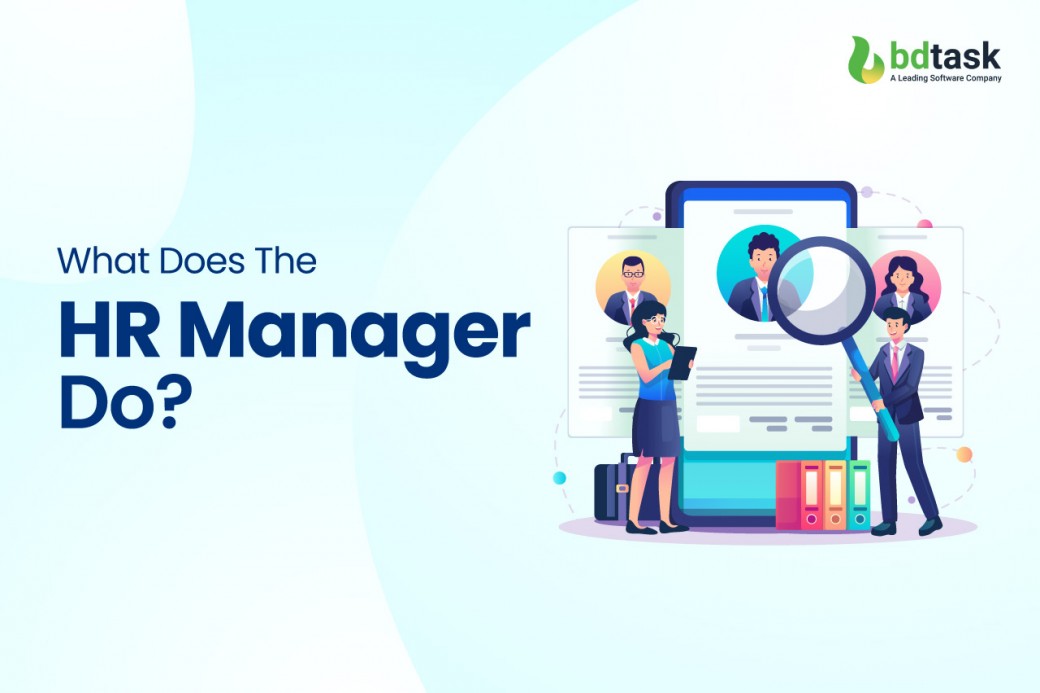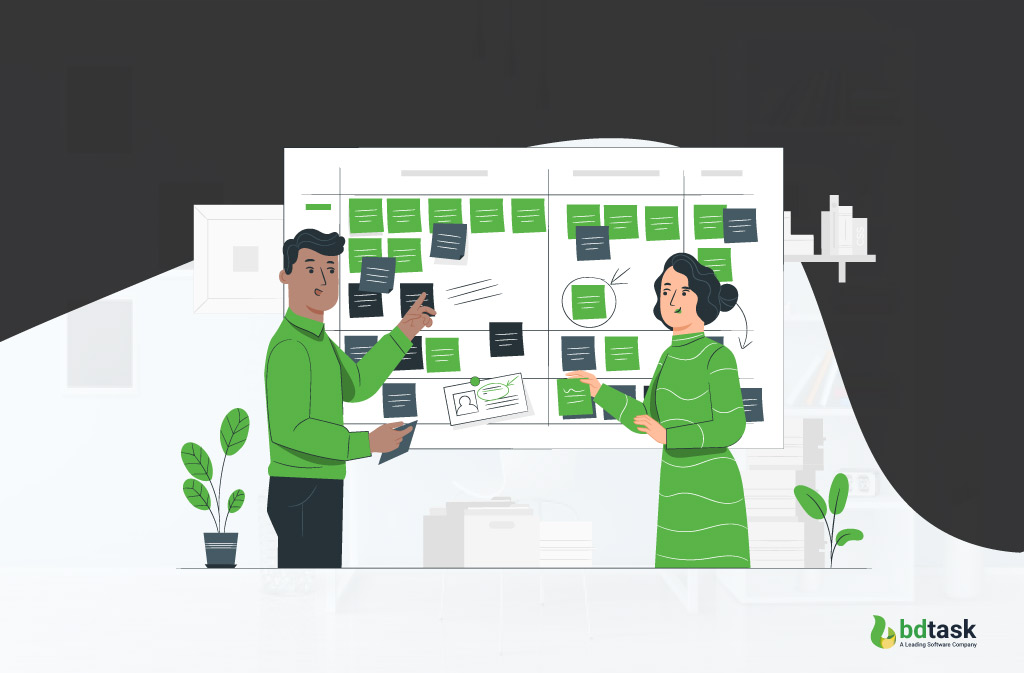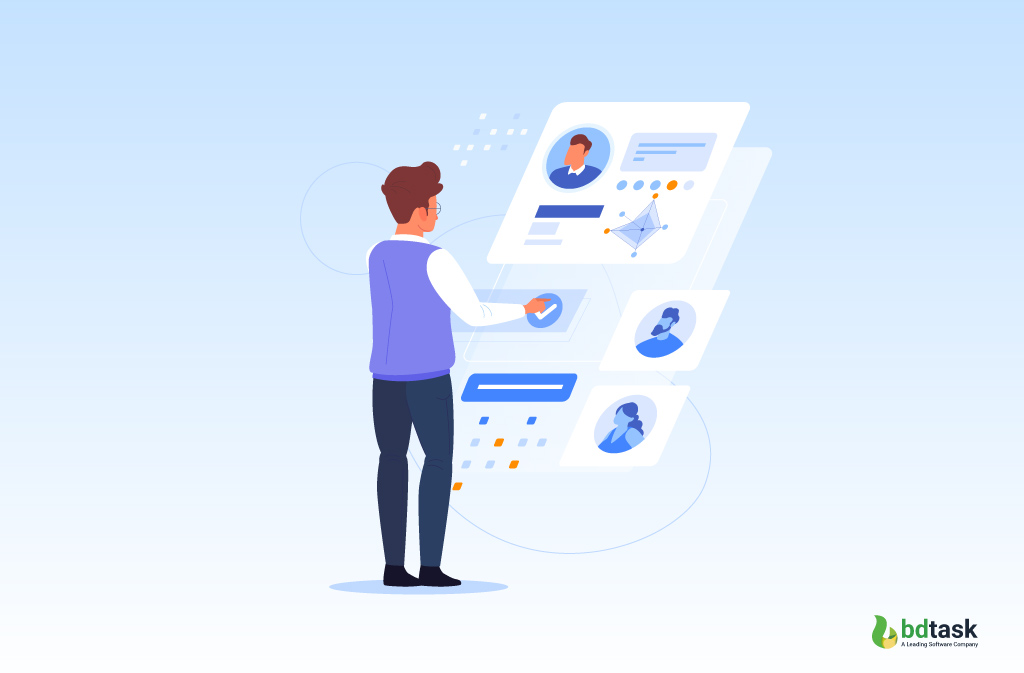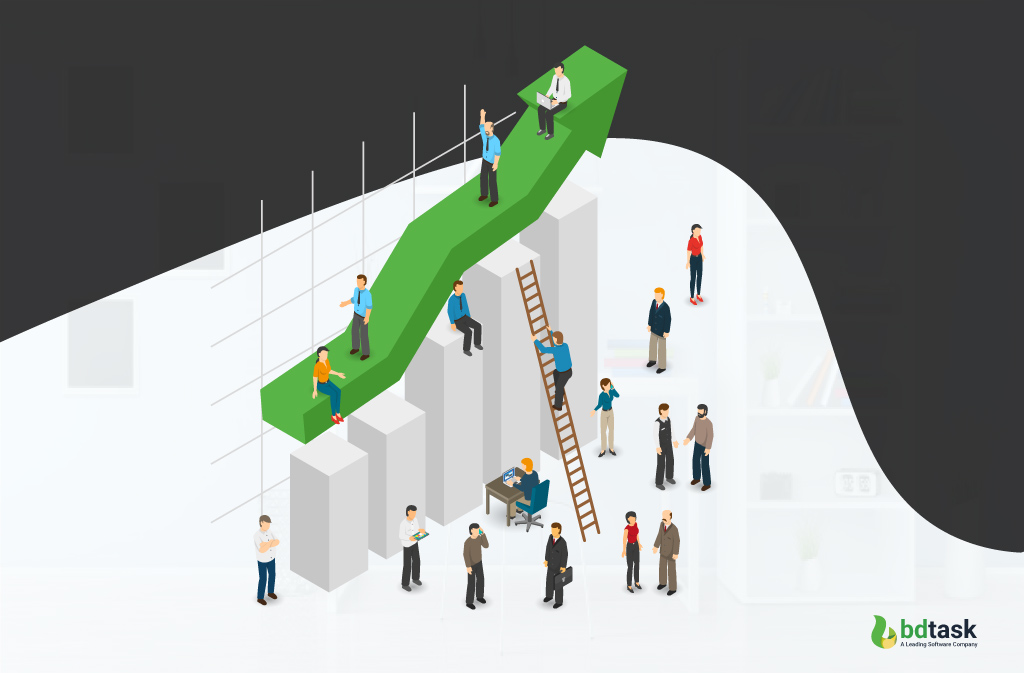What Does The HR Manager Do?

Modern technology is a blessing for every business sector. Although it assists in utilizing an organization’s resources effectively, Human Resource Managers ensure human resources’ best utilization. In this case, one question may arise in your mind; what does the HR manager do?
To build an enlightened nation, Teachers play an inevitable role. Likewise, to build the workforce of an organization as an asset, HR contributes remarkably.
Certainly, the business organization will never achieve its aim and objectives without HRM. Moreover, it is an inevitable part of an organization.
But have you ever realized how an HR manager contributes to the development of the organization?
Well, it seems like a complicated question. Everyone answers this question from their own perspective. At first, the proper understanding of HRM is a must to realize the contribution of HR personnel.

What is HRM?
Elton Mayo was an Australian psychologist. In 1924, he conducted different experiments on human resources. He evaluated that there is a strong connection between employee relations and productivity. Also, Elton Mayo included that employee relations directly impact workforce performance. It is considered that the Father of Human Resource Management is Elton Mayo.
HRM deals with an organisation's human resources.
In a word, it is the process of managing and developing the employees of an organisation. Besides, the process also includes recruiting, training, learning, continuous development, motivating, monitoring, and providing benefits to the employees.
Moreover, HRM assures safety, maintains effective relations, and establishes an organisation's congenial environment. HRM conducts effective planning, directing, controlling, and organising in an organisation. Besides, human resources utilise other resources of an organisation.
So, without human resources, other resources are valueless.
Why Is Human Resource Management Important?
Human resources are the heart of an organization. And the HRM nourishes the Heart.
Business organizations have to conduct several business operations. Every business activity is interrelated with each other.
As a result, if any of the activity goes wrong, it negatively impacts the entire business operation.
A business organization relies on different resources. The resources are mainly categorized into three.
- Human resources
- Financial resources and
- Material resources.
Human resources are the most significant resource among them. So, the best utilization of human resources assures the ultimate success of the business organization.
There are several departments in an organization. Each department manages specific resources of the organization. The HRM department manages the human resources of an organization properly. In this case, the human resources manager plays an essential role. With the help of HR software, hr manager do their daily work easily and productively.
However, you need to have a better understanding and proper knowledge of Human Resource Management that will help you to evaluate the HR manager's contribution.
HRM of Different Types of Organizations
Every business organization has some employees, more or less, who work to better the organization. To manage the employees properly, Human resource management plays an inevitable role. In a small business a medium-sized business, or a large business organization, employees are organized and handled by HR professionals.
The maintenance of human resources in different business organizations is different, as the number of employees varies from business to business.
The number of employees in an organization depends on the size of the organization. As a result, the functions of HRM in different companies are distinctive.
In a small-sized business organization, the employee numbers are less. HR can easily handle the employees properly. In this case, the employee can benefit by receiving effective training effectively.
The competition between the employees in a small business is lower than in a medium or large company.
On the other hand, a large organization has to maintain a large number of employees, which is a difficult task. In this case, the company’s HR professionals use modern technologies by which they can control and monitor the company’s workforce.
The performance of the employees can be easily monitored by business management software. Small, medium, or large business organizations can use the software to manage the workforce more efficiently.

What Are The Purposes and Functions of HRM?
Effective HR practices are inevitable. It can also ensure the attainment of the aims and objectives of an organization. Moreover, the HR department manages the workforce.
Furthermore, HRM controls the attitudes and behaviour of the employees. So they can regulate the employees systematically. Specific and selective purposes make it easier to complete any task.
Every department of an organization has specific purposes. Based on the purposes, the individual department conducts its operation. The purposes are selective. But, the activities can vary according to the situation.
Purposes of HRM
The HR department also has specific purposes in an organization. This department regulates its activities by following its objectives.
1. Staffing
Staffing refers to the management of the workforce in the workplace. It is the job analysis, planning, recruiting, and controlling the employees. HR ensures the desired number of employees to conduct an organizational operation in this process.
However, a significant purpose of HRM is staffing because it indicates the proper planning and management of an organization's human resources.
This process includes the below points.
Human Resource Planning
HR has to plan the entire staffing process. As planning is the first and foremost task, HR has to do it more efficiently. Moreover, they plan the recruitment and selection process.
The recruitment process of an organization can be done in different ways.
- Internal Recruitment process
- External Recruitment process
Based on the organisation's situation, HR chooses one of the recruitment processes. Both internal and external recruitment systems have strengths and weaknesses.
Therefore, the proper HR planning ensures the completion of the next steps. So, time and financial resources will be misused without adequate planning.
Job Analysis
Job analysis means the establishment of required skills and knowledge for the desired vacancy. The HR analyzes the requirements of an individual department.
Then, based on the needs and demands of a particular position, they take the next step. Afterward, HR publishes a vacancy announcement for the organization.
- Recruitment
Recruitment is the process of attracting, interviewing, and hiring employees for a particular position in an organization. It is a crucial task. As a result, HR conducts this process in every business organization.
- Selection
HR has to select qualified candidates from a large number of applicants. So, this selection process must be free of biases.
2. Training
Providing adequate training to recruited employees is one of the most significant purposes of HRM.
3. Motivating the Employees
To motivate the trained employees of the organization, HR plays an essential role. However, it is a crucial purpose of HRM in an organization.
4. Raising Employee Retention
Increasing the retention rate is a vital purpose of the HRM of an organization. Besides, it is associated with employee satisfaction.
5. Developing Skills
The continuous learning program helps the workforce of the organization to improve their knowledge and skills. Besides, the primary purpose of HRM is to develop the skills of employees.
6. Establishing the Policies
The employees of an organization have to follow some ethics. The purpose of HR is to develop ethical policies in the organization. Besides, they help the workforce to adapt to the policies. However, fulfilling the purposes of HRM ensures the achievement of business objectives directly.
Functions of HRM
The functions of HRM include the hiring and the growth and development of employees. The HRM of an organization develops the capability of the employees. So, the functions of HRM greatly influence the improvement of the organization.
1. Human Resource Development
The vital function of HRM is to develop human resources in an organization. The HRM focuses on this development process properly.
As a result, Without developing the workforce’s skills and knowledge, the organization cannot enhance its productivity.
The development of the workforce relies on the proper training and development program. It includes the following points :
- Providing Training
Effective training assists the employees in doing their given tasks properly. The training program helps them to understand their working procedure. So, it is a vital task to build the workforce.
- Continuous Development Program
The continuous development program helps the organization to improve its skills and knowledge. In this regard, the development program is provided for the future growth of the employees.
- Career Planning
The employees can develop their career goals and aims. The development of professional skills helps the employees to plan their future goals.
- Career Growth
The workforce can assure their future career development. The HRM helps them to set a target and work appropriately according to the plan. As a result, they can overcome the barrier to their career goal.
2. Compensation
The reward helps the employees to contribute more to the development of the organization. Based on the performance of the employees, they are provided with compensation.
The organization offers three types of compensation.
- Non-financial Compensation
The organization sometimes encourages the employees to perform better. It helps them to get inspired for the next step. This is non-financial compensation.
- Financial Compensation and
On the other hand, Financial compensation is a common compensation system in the organization. For the desired level of performance, the organization increases the salary of the employees.
- Indirect financial Compensation
Sometimes, the employees need sick leave, vacation, and other facilities. In this case, the dedication to the development of the organization increases. This type of facility is called indirect financial compensation.
3. Healthy and Safety
A safe and healthy working environment ensures a better workplace.
The employees of an organization can work properly if the health and safety environment is maintained.
- Healthy: It includes both the physical and mental health of the employees of an organization.
- Safety: Security means protection within the workplace for the employees.
4. Employee Relations
Employee relations indicate the relationship between employees and employers. Also, it includes the laws and policies of the country.
A strong relationship between employers and employees ensures a sound communication system in the workplace. HRM functions are directly related to the development of the organization. Besides, the employees of the organization can develop their skills and goals.

Who are the HR managers?
The professionals in an organization who play an inevitable role in attaining the desired objectives by hiring, managing, controlling, organizing, and developing the company's workforce are known as HR managers.
Moreover, HR managers are the key individuals in an organization. The productivity and profitability of the organization highly rely on the effective operation of the HR managers.
What Does The HR Manager Do - Role And Responsibilities
In an organization, HR managers have to conduct several activities. Understanding the roles of HR professionals will help you evaluate their contributions. In addition to this, you should know how they contribute to improving the organizational goal.
1. Hire Employees
HR managers regulate the recruiting process of an organization. Recruiting is an essential process by which the organization can achieve their goal.
Well, let me explain.
Suppose the recruiters select unqualified candidates. In this case, they will not contribute effectively to the betterment of the organization.
On the other hand, the desired candidates can make it easier to gain the company's success. So, the hiring process is the primary task for the HR personnel in an organization. So, this activity should be conducted efficiently.

2. Organize the Workforce
The new employees are not aware of the organization's environment. HR managers help new employees introduce themselves to their colleagues.
Personal information and other relevant data are kept securely. HR managers do this task properly. Moreover, the HR managers of an organization organize other activities like arranging an orientation program, informing the employees about the organizational culture, introducing them to the mentors, etc.
3. Train the Hired Employees
After completing the selection process, the HR managers must provide adequate training to the candidates. Then, HR managers allocate the tasks among the recruited candidates based on their qualifications and experiences. Afterwards, HR professionals provide training to them according to their requirements. It is an essential task of HR managers to make them fit for the given job.
4. Regulate the Work Culture
The new employees are not aware of the organizational culture and behaviour. Human resources manager make them understand the culture of the organization. Besides, HR managers establish a workforce culture in the workplace systematically.
5. Manage the Workforce
HR managers' vital role is to manage the company's workforce. The HR managers correctly record the attendance and absence of the employees. Besides, the HR personnel monitors the performance of the employees properly. The management of the organization's workforce is a difficult task. However, the HR managers have to manage them with great care.
6. Motivate the Workforce
HR managers have to motivate the employees properly. The proper motivational process helps the employees to be more on the job.
For example, an employee may face difficulties while performing a task. In this case, the employees feel uncomfortable. So they cannot focus entirely on the given task. If the organization's HR managers provide the necessary support to complete the task, they will feel more confident finishing it. Motivation is one of the most significant activities of HR managers. HR managers should properly motivate the company workforce to enhance the performance of the employees.
7. Provide Rewards and Recognition
The HR managers give proper support to the employees of an organization. They help to finish the task within the deadline.
Besides, the employees get rewarded for better performance and considering other criteria. Sometimes, HR managers increase the employee's remuneration based on their performance. The skilled and experienced employees get benefits. Moreover, HR professionals give them proper recognition for the best performance.
8. Payment Management
The employees are working for the betterment of the organisation. HR managers fix the salaries of employees by considering various factors.
These factors include experience, skills, knowledge, performance, dedication, etc. HR professionals need to pay the employees promptly. After evaluating the monthly performance record, they take further steps. The HR managers in an organisation have huge responsibility of hr managers and roles. The organisation's development depends on how HR organises and manages the company's workforce.
What are the Benefits of HR Practices?
The HR of an organization contributes a lot to the attainment of the organization's aims and objectives. The effective practices of HR positively affect the entire business operation. Not only do the employees benefit, but the employers of an organization also benefit.
Benefits of HR Practices on Employees
Employee Input
Proper HR practices in an organization help the employees to conduct their tasks properly. HR designs the job effectively. So, the process of employee input is done effectively. Moreover, the employees can be involved more in working together for the betterment of the organization. It enhances their skills and development.
Enjoying the Job
The HR of an organization should provide adequate facilities to the employees. The proper facilities and the organization's payroll services help the employees enjoy their jobs. When they get more advantages in the workplace, the satisfaction level increases.
Self Confidence
The proper training and development program helps the employees of an organization to develop self-confidence.
Balancing Work Life
Effective HR practices help the employees of an organization to maintain a balance between work and life. If the organisation's employees find a balanced working environment, the retention of employees increases. On the contrary, without balanced work, the workforce leaves the organization.
Job Satisfaction
HR of an organization focuses on the enhancement of the satisfaction level of the employees. If the HR practices are proper, the company's employees are satisfied.
Higher Salary
The HR of an organization appropriately monitors the performance of the employees. HR increases the salary of an employee based on his account.
In this case, the employees get benefits while getting a higher salary. Moreover, the training and development program helps the employees to increase their salary. Furthermore, they can be well trained and organized by receiving adequate training. However, an organisation's employees benefit directly and indirectly from HR practices.

Benefits of HR Practices on Employers
Attaining Organizational Goal
The appropriate job design of the company helps to develop a healthy workforce. The HR practices assist a lot in improving the ability of the employees. So the employees can achieve the objectives and goals of the company properly.
Competitive Edge
The HR practices help the employees to be more proactive and dynamic. The advancement of the employees assists in gaining the competitive advantages of the organization.
Growth and Development
HR practices directly affect the growth of the company. In addition to this, proper development dramatically relies on effective HR practices.
Reduce Production Cost
Skilled employees do their tasks more efficiently. Besides, HR adopts several advanced technologies to reduce the cost of production nowadays. For example, if the HR manager uses the business management system to manage the workforce, it can save money and cost.
Increase Productivity
HR practices positively affect the productivity of the organization. For example, employees can contribute more to the job to finish any task properly. So, the productivity of the company increases.
Enhance the Profitability
The profitability of the organization increases if the HR practices are done correctly. Adequate training and continuous learning programs make employees more perfect. As a result, the employees' efficiency positively impacts the organisation's profitability.
Increase Employee Retention
HR practices assist in increasing employee retention in the organization. For instance, HR provides employees with a seductive salary and other facilities. In this regard, job satisfaction rises, positively impacting the organization.
How HR Practices Impact Profitability and Productivity?

HR practices are interconnected with an organization's performance management. Effective HR practices play an inevitable role in raising the company's productivity. Besides, it positively impacts the profitability of an organization. HR of an organization manages the workforce. It is a crucial task for the HR of a company. Performance management is one of the most significant HR tasks. It directly affects the development of organizational goals.
Performance management includes-
- Assessment
- Feedback and
- Compensation
HR evaluates the performance of the employees. They give proper recognition and appraisal for better performance to the employees.
If employees get helpful feedback, they can improve their performance in the future. Moreover, HR provides remuneration to the employees based on their performance. Suppose an employee does a better job compared to others. He is skilled and expert in doing his tasks. In this case, HR raises his salary.
1. HR Practices Impact on Productivity
Effective Selection Process
HR conducts the hiring and recruiting process. They hire a talented and skilled workforce. A qualified and experienced workforce contributes significantly to the improvement of the organization. So, the hiring process positively influences productivity.
Problem Identification
Employees conduct several jobs. HR provides them with those tasks. While performing any task, the employees face difficulties. HR helps them to solve the issue. This activity affects the productivity of the organization.
Proper Motivation
HR acts as a leader in an organization. The HR motivates the employees to contribute more to achieve the objectives.
The proper motivation encourages their ability. And this impacts productivity.
Adequate Training
The training provides a guideline for the employees to conduct any specific task. HR offers efficient training for the employees.
So the employees can finish the given task successfully. Besides, proper training makes them more active and skilled.
Continuous Development Program
In an organization, a continuous learning program plays a significant role. Also, it assists the employees to keep up to date. Besides, they can learn many useful things which help them to solve any problem.
Good Communication System
HR assures a strong relationship among the employees. And it depends on the communication system within the workplace. In this case, the employees will have a better work environment. The performance of employees also directly affects the organization's productivity.
A better environment assures better performance.
Adoption of Technology
HR allows advanced technology in the workplace. It helps the organization to increase productivity.
Suppose an employee cannot come to the office for any cause. Besides, an employee can face any difficulties when coming to the office on time.
In this case, modern technology helps them to complete the given task at home. Moreover, if anyone wants to work remotely, HR provides them the scope.
Technology eases the way of success. In addition to this, HR manages the workforce efficiently by adopting the latest technologies. As a result, the productivity of the organization rises.
2. Impact of HR Practices on Profitability
Increase Production
HR helps an organization fit its employees for a job. Workforces can improve their performance. As a result, production increases. If an organisation's production increases, the company can increase its sales percentage. Thus, profitability is enhanced. Moreover, the workforce benefits from using modern technologies. HR trains them to learn how to operate the technology efficiently.
Customer Satisfaction
HR develops the workforce properly. So they can offer services to the customers properly. In this case, the proper support and services improve their satisfaction level.
The high level of satisfaction of the consumers assures the profitability of the organization.
Effective Time Management
HR controls the employees of a company. Besides, they monitor the performance of them. HR is always aware of receiving the task from the employees in time. Suppose the employees can submit the task within the deadline. In this case, productivity increases. It affects profitability directly.
Reducing the Cost
Proper HR practices can reduce the cost of production of an organization. Besides, the cost reduction helps to boost their sales. The sales percentage increases. So the company can earn more profit.
How the Laws and Legislations Influence HR?
No organization can regulate its business operation without appropriately obeying the rules and regulations.
Business organizations need to follow legislation and laws properly. The government of the country has developed some rules for conducting business operations. HR must follow the acts effectively. According to the laws, employees should be treated well. Moreover, employment legislation significantly impacts HR practices in an organization.
1. Ethical Consideration
Business organizations must follow some ethics while managing the business. HR practices should follow ethics.
In an organization, several employees work together. HR managers should provide proper job security to their employees.
Employees and employers have to maintain business ethics. Proper HR practices affect the ethics of the business organization. Every country currently allows some everyday acts to help operate the business. Significantly, HR managers must be more careful to ensure the proper legislation practices are followed.
2. Gender Discrimination Act 1975
The organization should be aware of sex discrimination laws. HR allows the act in the workplace. In this case, the employees get a good working environment.
Besides, HR cannot discriminate against the workers between males and females. The female workers get proper facilities when they are required to do so.
3. Race Relation Act 1976
HR of an organization must implement this act in the organization. This act helps HR to maintain equality in the workplace.
Equality in the organization makes sure of a pleasant working environment.
4. Employment Act 2002
HR should allow the Employment Act because it helps ensure the employees' proper rights. Moreover, this act makes employees more securely involved in an organization. As HR conducts the employment process, they should know this act.
5. Data Protection Act 2018
Personal data and information are confidential. So, HR cannot reveal personal information. Besides, HR should secure the personal information of an employee. In this regard, the data protection act helps a lot.
6. Healthy and Safety Act 2015
A healthy environment in the workplace assures a better performance of employees. Besides, safety and security are a must to operate the business.
HR can maintain the safety and security within the workplace. In this case, this act should be implemented. All of the acts contribute a lot to regulating the workforce of an organization properly. As HR manages the workforce, they need to consider those acts more prominently.
In addition to this, these acts affect HR practices in an organization. Moreover, HR can maintain an organization's employees more efficiently, provided that the acts are appropriately implemented.
Future of Human Resource Management
Effective planning for future development assures a fruitful outcome.
HR officers of an organisation should be aware of the plan. The technologies are improving daily, and HR managers must properly know the updated technologies.
Shortly, AI systems will be available in third-world countries. The USA and the UK currently implement the AI system in their business organisation.
Besides, HR managers can manage the workforce easily.
As the first world countries are more advanced in technology, they can utilise the benefits effectively.
For example, in the USA, many multinational companies can conduct their business successfully compared to others. The facilities and the country's rules and regulations greatly help the organisation's development. The AI system will offer the most value in sourcing, screening, nurturing, engaging, and interviewing the candidates. AI tools perform better than humans when analysing employee surveys.
The AI system saves operational time. For example, the HR professionals of an organisation need to regulate the recruiting process. In this case, more time is required to check out the CVs submitted by the applicants. Artificial Intelligence and hr software help to complete the task accurately. So choosing hr software plays a huge role in that. Wrong hr software dont bring any results otherwise decreases the potential of hr managers.
On the other hand, the performance of the employees can be adequately monitored. The evaluation process of employee activities can be done error-free. However, an organisation's human resources will be utilised more efficiently in the long run. Besides, the organisation can improve its productivity and profitability in the future.
A Case Study
Creative ideas and unique thinking of HR personnel assist in growing and developing the organisation efficiently. The larger enterprises must undergo a lengthy process while practising HR operations. Although the organisation's strategies are different, the essential functions and purposes of HRM are identical. Amazon, Google, and Apple must be considered by some successful and renowned business organisations worldwide.
Do you know how they manage their human resources?
Well, it is not mandatory to follow their strategies and techniques. However, you can learn how successful business organisations' HR managers contribute to utilising human resources. Google is a giant company. The HRM of Google is well-developed.
The HR professionals of the company always focus on the creative individual rather than the experienced one. Moreover, Google's HR managers believe innovative ideas and creativity can ensure long-term sustainability.
Can you imagine how Google manages its large workforce?
Effective management of the workforce is one of the most challenging tasks. Google, at first, organises its employees properly. Afterwards, several development programs provide the employees with adequate learning facilities.
The CDP helps Google employees be involved in the decision-making process. In this regard, the HR managers feel more confident in taking any step. Moreover, the adoption of newer technologies eases business operations nowadays.
If the HR personnel wants to regulate the activities efficiently, they need to keep up-to-date. At present, the technologies help the business organization to manage the business operation more efficiently.
Business management software is the best business solution that can be used by HR professionals. In this case, the best HR software helps to maintain the employee's organisely.
Bottom Line
Human resource management is a vast term in the organizational context. Understanding the purposes and functions of this department is crucial.
The workforce is the Root of an organization. And HR managers manipulate the root. However, the effective practices of HR ensure the sustainability and proper growth of an organization.










